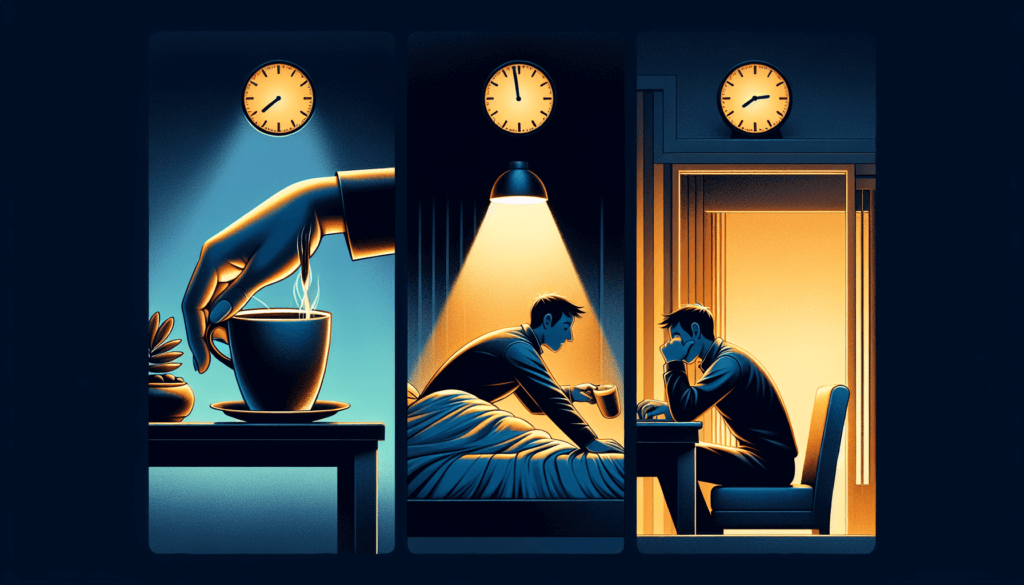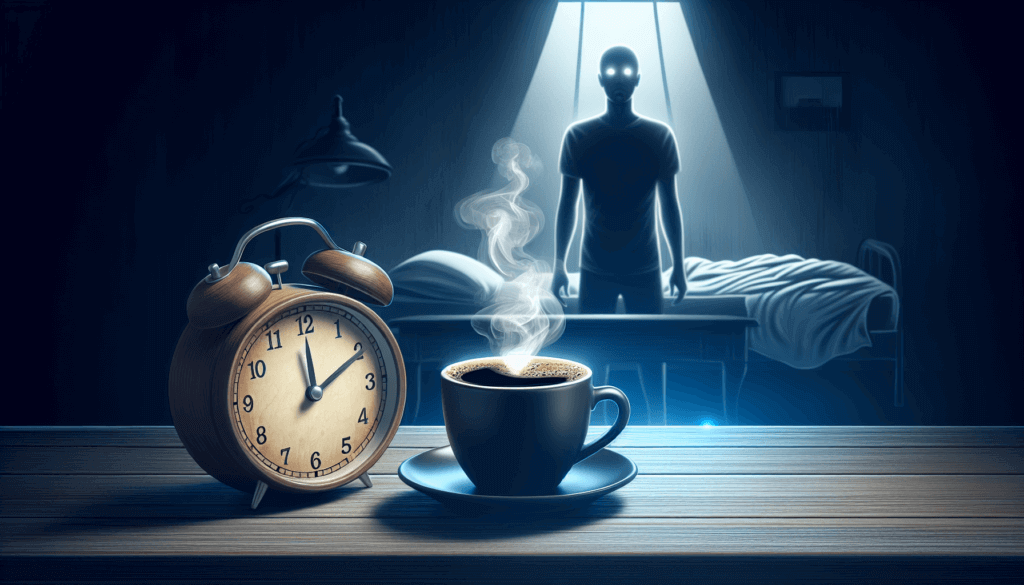Imagine the aroma of a freshly brewed cup of coffee wafting through your kitchen every night. The rich, comforting scent draws you in, and you can’t resist indulging in a warm, soothing sip before bed. But have you ever wondered what effects this nightly ritual might have on your body? In this article, we explore the potential consequences of drinking coffee every night and shed light on whether it’s a harmless habit or one that may disrupt your sleep and overall well-being.
Effects of caffeine on sleep patterns
Caffeine inhibits adenosine receptors
When you consume coffee or other caffeinated beverages, one of the primary effects is the inhibition of adenosine receptors in your brain. Adenosine is a molecule that naturally builds up in your system throughout the day, promoting feelings of drowsiness and signaling your brain that it’s time to sleep. By blocking the adenosine receptors, caffeine prevents this natural process from occurring, making it more difficult for you to fall asleep when you want to.
Disruption of sleep-wake cycle
As a consequence of inhibiting adenosine receptors, caffeine can disturb your sleep-wake cycle. Your body has an internal clock known as the circadian rhythm, which regulates your sleep patterns and helps you maintain a consistent sleep schedule. When you consume caffeine at night, it can disrupt this rhythm, making it challenging for you to fall asleep at the desired time and waking you up frequently throughout the night.
Decreased total sleep time
Consuming coffee regularly, especially in the evenings, can lead to a decrease in your total sleep time. The stimulating effects of caffeine can cause you to stay awake for longer than desired and reduce the overall duration of your sleep. This can leave you feeling fatigued, groggy, and unable to function optimally the next day.
Increased sleep latency
Sleep latency refers to the time it takes for you to fall asleep after getting into bed. Even though you may feel physically tired, consuming caffeine in the evening can increase your sleep latency, making it take significantly longer for you to fall asleep. This can be frustrating and disruptive to your bedtime routine, leading to a restless night and a feeling of unease.
Reduced deep sleep
Deep sleep, also known as slow-wave sleep, is a stage of sleep that plays a crucial role in physical and mental restoration. Unfortunately, caffeine consumption close to bedtime can interfere with deep sleep. Research has shown that caffeine can decrease the amount of time spent in this restorative phase, leading to feelings of tiredness and impaired cognitive functioning the following day.
Delayed melatonin secretion
Melatonin is a hormone that regulates sleep, and its secretion is influenced by your sleep-wake cycle. However, caffeine intake before bedtime can delay the natural release of melatonin, making it harder for you to fall asleep. This disruption in melatonin secretion can throw off your sleep routine, negatively affecting the quality and duration of your sleep.
Gastrointestinal issues
Stomach irritation
Regular consumption of coffee, particularly on an empty stomach, can lead to stomach irritation. The high acidity of coffee can irritate the lining of your stomach, leading to discomfort, stomach cramps, and even potentially triggering acid reflux.
Acid reflux
The consumption of coffee, due to its acid content, can contribute to the development or exacerbation of acid reflux. Acid reflux occurs when the acidic contents of the stomach flow back into the esophagus, causing a burning sensation in the chest (heartburn) and regurgitation.
Heartburn
Heartburn, a common symptom of acid reflux, can be triggered by the consumption of coffee. The high acidity levels in coffee stimulate the production of stomach acid, which can then back up into the esophagus, causing the characteristic burning sensation in the chest and throat.
Increased bowel movements
Caffeine acts as a diuretic, which means it increases urine production. However, it can also have a laxative effect on your digestive system, leading to an increase in bowel movements. This can result in loose stools or even diarrhea, especially when consumed in large quantities or on an empty stomach.

Dehydration
Diuretic effects of caffeine
Caffeine is a natural diuretic, which means it promotes the production of urine and increases fluid excretion from your body. When you consume caffeine, it can cause you to urinate more frequently and can contribute to dehydration if you’re not adequately replenishing your fluids.
Increased urine output
Due to its diuretic properties, caffeine can cause an increase in urine output. This can be particularly problematic if you consume caffeine before bedtime, as it may result in waking up multiple times during the night to use the restroom. This can disrupt your sleep and lead to feelings of fatigue and dehydration.
Potential fluid imbalance
Consistent consumption of caffeinated beverages, especially when not balanced with sufficient water intake, can lead to a potential fluid imbalance in your body. If you’re relying heavily on caffeinated drinks for hydration, it’s important to be aware that they can contribute to an overall decrease in fluid levels, potentially leading to dehydration if not compensated for adequately.
Increased heart rate and blood pressure
Stimulation of sympathetic nervous system
Caffeine stimulates the sympathetic nervous system, which is responsible for the “fight or flight” response in your body. When you consume coffee regularly, especially in large amounts, it can lead to an increase in heart rate and blood pressure due to the activation of this system. This increased cardiovascular activity can put strain on your heart and may be problematic if you already have underlying heart conditions.
Risk for hypertension
The combination of caffeine and increased blood pressure can put you at an increased risk for hypertension, or high blood pressure. Hypertension is a chronic condition that can have serious implications for your overall health, including an increased risk of heart disease, stroke, and kidney problems. Limiting or avoiding caffeine consumption can be an important step in managing and preventing hypertension.
Increased cardiac workload
The stimulant effects of caffeine can lead to increased cardiac workload, particularly if you consume large quantities of it regularly. This added stress on your heart can be problematic, especially if you have an existing cardiovascular condition. It’s essential to be mindful of your caffeine intake and consider the potential impact on your heart health.

Interference with sleep disorders
Insomnia
Individuals who struggle with insomnia, a sleep disorder characterized by difficulty falling asleep or staying asleep, should be cautious about consuming caffeine. Even in small amounts, caffeine can worsen insomnia symptoms and make it even more challenging to achieve a restful night’s sleep. It is generally advised for individuals with insomnia to limit or eliminate caffeine intake, particularly close to bedtime.
Restless leg syndrome
Restless Leg Syndrome (RLS) is a neurological condition that causes an irresistible urge to move your legs, often accompanied by unpleasant sensations. Caffeine consumption has been found to exacerbate symptoms of RLS, making it more difficult for individuals with this condition to find relief and achieve a comfortable sleep.
Sleep apnea
Sleep apnea is a sleep disorder characterized by interrupted breathing patterns during sleep. Caffeine can potentially worsen sleep apnea symptoms and increase the frequency of episodes where breathing stops or becomes shallow. For individuals with sleep apnea, minimizing or avoiding caffeine intake, especially before bedtime, may be beneficial in managing their condition.
Anxiety and jitteriness
Caffeine-induced anxiety
One of the well-known effects of caffeine is its potential to induce anxiety symptoms. Caffeine stimulates the release of stress hormones such as cortisol and adrenaline, leading to increased feelings of nervousness, restlessness, and even panic in sensitive individuals. If you are prone to anxiety or have an anxiety disorder, it’s important to be mindful of your caffeine intake and consider reducing or eliminating it to manage your symptoms more effectively.
Overstimulation of central nervous system
Caffeine acts as a stimulant on the central nervous system, increasing alertness and wakefulness. However, excessive caffeine consumption, especially in sensitive individuals, can lead to an overstimulation of the central nervous system. This can result in feelings of jitteriness, nervousness, and an inability to relax, potentially impacting your overall well-being and ability to function calmly.
Tremors and restlessness
When consumed in high amounts, caffeine can cause involuntary muscle movements known as tremors. These tremors can manifest as a slight shaking, especially in your hands, and may make you feel restless or on edge. If you experience tremors or restlessness after consuming caffeine, it may be a sign that you should consider reducing your intake or exploring caffeine alternatives.

Dependency and withdrawal symptoms
Development of caffeine dependency
Regular consumption of caffeine can lead to the development of dependency or addiction. Your body can become accustomed to the stimulant effects of caffeine, and over time, you may require increasing amounts to achieve the desired level of alertness or wakefulness. This dependency can make it challenging to function without caffeine and may lead to a cycle of reliance on the substance to fuel your daily activities.
Headache and fatigue upon cessation
When you abruptly stop or significantly reduce your caffeine intake after a period of dependency, you may experience withdrawal symptoms. Common withdrawal symptoms include headaches, fatigue, irritability, and difficulty concentrating. It’s important to gradually decrease your caffeine intake to minimize the severity of these symptoms and allow your body to adjust to a lower caffeine level more comfortably.
Impact on nutrient absorption
Reduced iron absorption
Caffeine consumption can interfere with the absorption of certain nutrients in your body, including iron. Iron is a vital mineral necessary for the production of red blood cells and maintaining good overall health. Coffee, in particular, has been shown to bind to iron, making it harder for your body to absorb this essential nutrient. If you have low iron levels or are at risk of iron deficiency, it’s advisable to avoid consuming caffeine with meals and consider other sources of iron-rich foods.
Decreased calcium absorption
Similarly to iron, caffeine can also hinder the absorption of calcium, which is crucial for maintaining healthy bones and teeth. Regular consumption of caffeinated beverages can lead to a decrease in calcium absorption, potentially contributing to the development of osteoporosis or other bone-related conditions. If you rely heavily on caffeine or have concerns about your calcium intake, it is advisable to consume calcium-rich foods separately from caffeinated drinks to optimize absorption.

Teeth staining and enamel erosion
Coffee’s high potential for staining teeth
Coffee, with its dark coloring, has a high potential for staining teeth. The pigments present in coffee can adhere to the enamel, gradually causing discoloration and staining over time. This can be particularly noticeable if you consume coffee frequently or engage in habits such as sipping coffee slowly throughout the day. Regular dental hygiene practices and professional teeth cleaning can help minimize the staining effects, but reducing coffee consumption or using straws can also be beneficial.
Acidic nature leading to enamel erosion
Coffee, along with other acidic beverages, can contribute to enamel erosion. The high acidity levels in coffee can weaken the protective layer of enamel on your teeth over time, leaving them more susceptible to damage, tooth decay, and sensitivity. It is important to be mindful of the potential consequences of coffee’s acidic nature and maintain good oral hygiene practices to mitigate the risks.
Effect on pregnancy
Increased risk of miscarriage
Pregnant women are advised to limit their caffeine intake due to its potential adverse effects on fetal development. High caffeine consumption during pregnancy has been associated with an increased risk of miscarriage. The exact safe limit of caffeine consumption during pregnancy is still debated, but it is generally recommended to restrict caffeine intake to 200mg per day or less to minimize potential risks.
Impact on fetal development
Caffeine easily crosses the placenta, and excessive consumption during pregnancy can affect fetal development. Studies have linked high caffeine intake during pregnancy to an increased risk of low birth weight, preterm birth, and developmental issues in children. To ensure the well-being and healthy development of your baby, it is crucial to be mindful of your caffeine intake and follow the recommendations provided by healthcare professionals.
In conclusion, while the effects of caffeine can vary from person to person, it is important to understand and consider the potential consequences of consuming coffee regularly, especially in the evening or in large amounts. From its impact on sleep patterns to its potential negative effects on various bodily functions, being aware of the potential risks associated with caffeine can help you make informed choices and maintain a healthy lifestyle. Remember to listen to your body and consult a healthcare professional if you have concerns about your caffeine consumption and its impact on your overall well-being.



